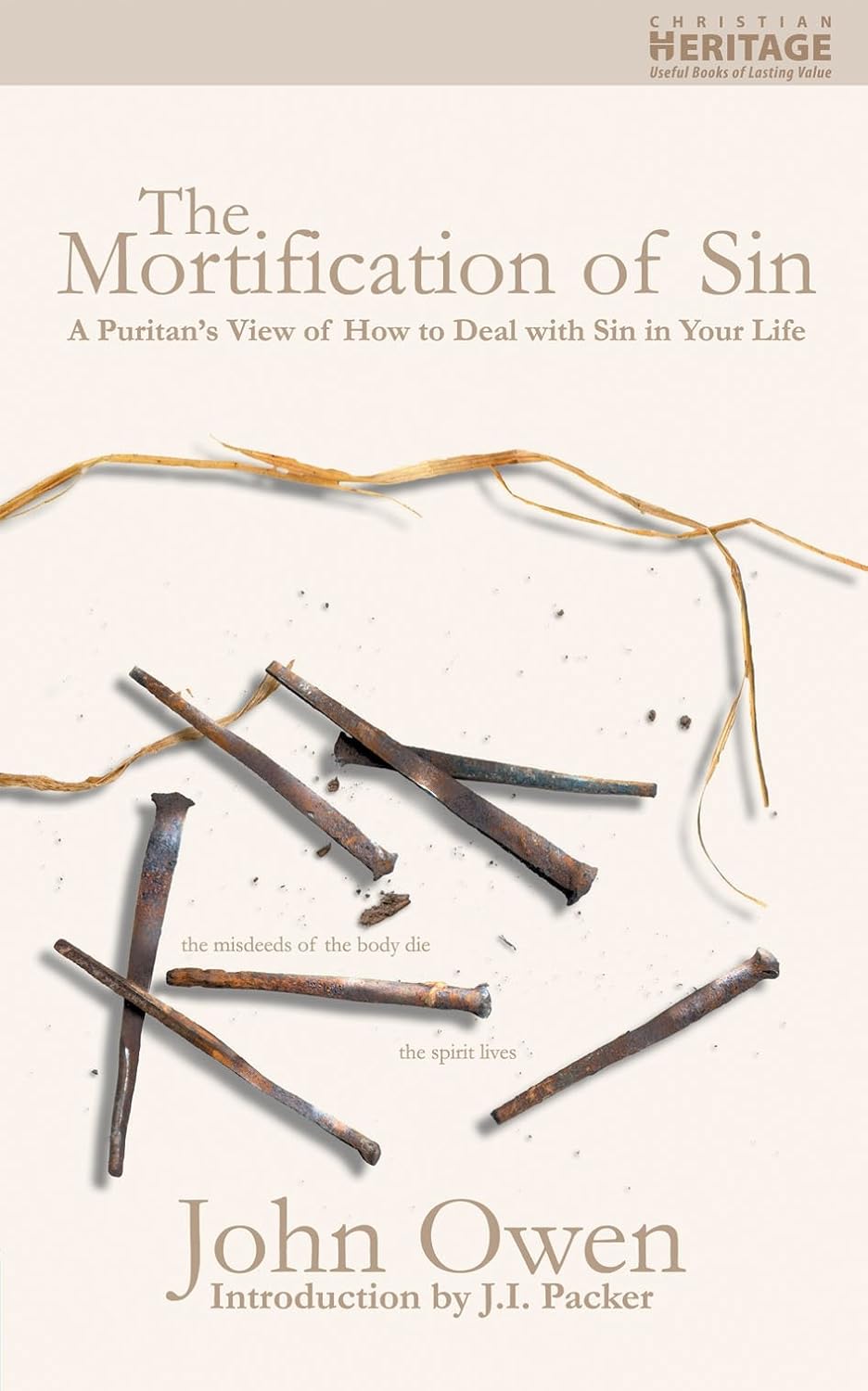Review of The Mortification of Sin by John Owen
This is one of the most challenging books I have ever read. Every Christian would benefit from reading this book: no one would profit from skimming it. Read this book, but do so slowly. Turn the page only after the previous one has worked its way into your soul. You will otherwise gain only a superficial intellectual familiarity with Owen’s argument and callous your soul to the challenge and reward of God’s work in your life.
The nature of that reward is one of the first things Owen takes up. The reward of the Christian life is not merely escaping to heaven after death. Eternal life isn’t only the indefinite extension of our lives into infinity in the afterlife, a simple addition to the quantity of life. Rather, godliness pays off now because we enjoy a better quality of life. We have more peace with God, more inner contentment, a cleaner conscience, deeper joy in everything, and consequently a more fruitful ministry to our families, friends, and churches. Owen says that “The vigor, and power, and comfort of our spiritual life depend on the mortification of the deeds of the flesh,” (24).
Because holiness pays off now, we should desire to kill sin. Owen’s book is a harsh condemnation of Christian laziness. If you truly understand the gospel and grasp what God is offering, you will be possessed of a fanatical zeal to murder the evil that haunts your soul. If you don’t find that yearning in your life, you either don’t understand the gospel or you don’t understand the danger you are in every day from sin and death. 
Sin is ever active; we are thus constantly in danger. “If, then, sin will be always acting, and we be not always mortifying, we are lost creatures,” (29). Sin is crafty and deceptive. “It is modest, as it were, in its first motions and proposals; but having once got footing in the heart by them, it constantly makes good its ground, and presseth on to some further degrees,” (31). Sin saps our spiritual strength; it “weakens the soul, and deprives it of its strength,” (51).
Sin, unaddressed, breeds disbelief. If we keep on sinning, we will never see evidence in our lives of the blessings God promises to his people, and we will thus gradually lose faith in those promises. “As sin weakens, so it darkens the soul. It is a cloud, a thick cloud, that spreads itself over the face of the soul, and intercepts all the beams of God’s love and favour. It takes away all sense of the privilege of our adoption; and if the soul begins to gather up thoughts of consolation, sin quickly scatters them,” (52). It hardens the heart, rendering it “sermon-proof,” so that “thou shalt not be at all concerned; but shall be able to pass over duties, praying, hearing, reading, and they heart not in the least effected,” (111).
All that is frightening enough. Here’s the truly terrifying part: there’s nothing we can do about it. Our own efforts are completely insufficient to fight sin. Rack and stack human nature against the power of sin, and we lose every time. Within this world, sin is an all-consuming, devouring beast. Left to ourselves, we are damned. “A soul under the power of conviction from the law, is pressed to fight against sin, but hath no strength for the combat. They cannot but fight, and they can never conquer; they are like men thrust on the sword of enemies, in purpose to be slain,” (46).
Our own work is futile. “Men are galled with the guilt of sin that hath prevailed over them; they instantly promise to themselves and God that they will do so no more; they watch over themselves and pray for a season, until this heat waxes cold and the sense of sin is worn off; and so mortification goes also, and sin returns to its former dominion.” (42-3). Relying on our own efforts to kill sin ensures whatever success we have will be temporary.
Owen makes clear what “mortifying” sin is not. It is not replacing bad habits with good ones, natural maturation, a change in circumstances, a discipline of self-improvement, or being frightened into good behavior out of fear of punishment (57-60, 99). None of those address the inward disposition of the heart. “A man may beat down the bitter fruit from an evil tree, until he is weary; whilst the root abides in strength and vigour, the beating down of the present fruit will not hinder it from bringing forth more,” (68). Mortifying sin means killing sinful dispositions in the heart.
In other words, we must view sin with God’s eyes and hate it. We must hate it because of its essence, not because it annoys us or makes us feel guilty, but because it is inherently hateful. Such hatred of sin comes ultimately from loving God. “Hatred of sin as sin, not only as galling or disquieting; [and] a sense of love of Christ in the cross; lie at the bottom of all true spiritual mortification…If thou hatest sin as sin, every evil way, thou wouldst be no less watchful against every thing that grieves and disquiets the Spirit of God, than against that which grieves and disquiets thine own soul. It is evident that thou contendest against sin merely because of thine own trouble by it.” (89).
So what do we actually do? Owen doesn’t offer his main point until halfway through the book. Mortifying is a matter of inner spiritual exercises. It involves “the implantation, habitual residence and cherishing of a principle of grace, that stands in direct opposition to [sin], and is destructive of it,” (71). “Whilst a man keeps a diligent watch over his heart, its root and fountain…lust withers and dies in it,” (90). The good news is that God has given his Spirit to his people to work for our sanctification. “He works in us and with us, not against us or without us,” (46). “All graces and good works which are in us are his,” (45). The Spirit mortifies sin in us “by causing our hearts to abound in grace;” through “a real, physical efficiency on the root and habit of sin;” and by “bring[ing] the cross of Christ into the heart of a sinner by faith,” (45).
Because I like checklists of concrete action, Owen’s emphasis on the inner state seemed highly abstract to me. I found myself trying to boil Owen’s recommendations down to specific things I can do (more Bible study, prayer, confession), which is probably the opposite of what Owen intends. He warns repeatedly against turning mortification into a series of behaviors lest you fall into legalism, a works-based salvation, or Catholicism. I confess I found this frustrating because it seemed to replace one conundrum (how to fight sin) with another (how to love God). Owen’s argument felt tautological: you get victory over sin once you love God perfectly, which is another way of saying the same thing.
Owen’s argument is (for anyone interested in the philosophical parallels) the triumph of Platonism over Aristotelianism. Plato argued that we achieve virtue through an inward turning of the soul. He has always been more popular with Protestants because of his influence on Augustine and thence Calvin and Luther. Aristotle, who emphasized the importance of practicing virtue through repeated behavior, has always been more popular with Catholics through his influence on Aquinas.
Owen gives the barest acknowledgment to the importance of practice and behavior in mortifying sin. “Exercise and success are the two main cherishers of grace in the heart: when it is suffered to lie still, it withers and decays,” (33) he says. Later, he acknowledges the importance of studying how, when, and where we sin so as to be better equipped to avoid it. “To labour to be acquainted with the ways, wiles, methods, advantages, and occasions of its success, is the beginning of this warfare,” (69; see also 129). These are pretty much the only comments he makes in this direction.
Owen (and Plato) is, of course, right. Outward behaviors are useless for one who has not yet made the turn, glimpsed the hatefulness of sin, been overcome by the cross of Christ, and been humbled by the grace of God. Afterwards, habits of discipline can be good means by which to remind ourselves of God’s grace, but beforehand they can be unhelpful distractions. “Duties are excellent food for a healthy soul; they are no physic for a sick soul,” (43). If your soul is healthy and you are looking for a good book on cultivating those duties, read Donald Whitney’s Spiritual Disciplines for the Christian Life. If you are struggling against a persistent sin and feel powerless over it, read John Owen’s book. It is one of the most intense, sustained meditations on the need for the inward turn away from sin, self, and death and towards the cross, Christ, and life ever written.












